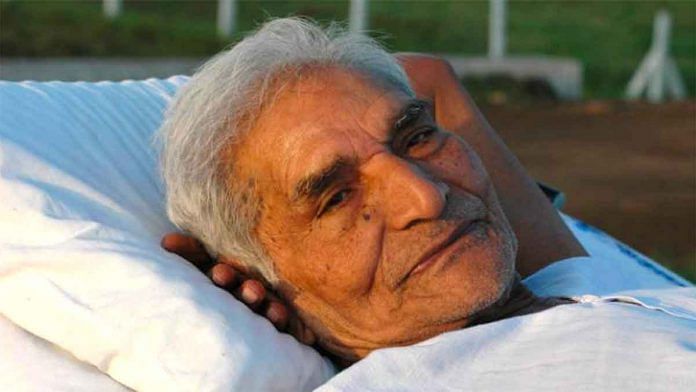New Delhi: “Politics without constructive work is sterile and constructive work without politics is impotent. In these conditions if the youth wish to achieve something they must break the shackles of passivity and caste differences. ‘Bharat Jodo’ (Knit India) is the real slogan, the real need of the day.”
These words by Murlidhar Devidas Amte, recalled by his granddaughter, could not ring truer in today’s polarised political atmosphere.
Giving up an affluent life
Baba Amte was a man of privilege, but extremely self-aware. Born in Wardha into a Hindu Brahmin family on 26 December 1914, he spent the first quarter of his life out hunting, horse riding and indulged in other activities that only the upper class had the privilege to access.
Finally giving in to his father’s wishes, Amte completed a degree in law and it was not long before he established a successful practice in Wardha. This is also the place where his father had four houses at his disposal along with a club membership that had the facilities of a tennis court and the likes. So, Baba Amte did his law practice through the week and handled the family properties over the weekend. It seemed like an easy life of privilege.
But Baba Amte had other plans.
“I was charging Rs 50 for arguing for 15 minutes while a labourer was getting only three-quarters of a rupee for 12 hours of toil. That was what was eating into me,” said Baba Amte on his profession as a lawyer and how the poor and marginalised were treated in India then.
On the outside, Baba’s early years may have seemed perfect, but he was not content. He always gravitated “towards the penniless, the destitute, the forgotten, and the silenced — people rejected by society”.
Baba Amte revolted against the treatment of lower-class servants in his house by playing and eating with their children.
The incident that led to Anandwan
With idols such as Rabindranath Tagore, Mahatma Gandhi and Sane Guruji, the dissatisfaction that Baba Amte dealt with resulted in him being involved with the freedom struggle. He even volunteered as a waste carrier to experience their plight first-hand.
One day, he encountered a sight that would change the course of his life, and many others. “A man in the last stage of leprosy. A rotting mass of human flesh with two holes in place of a nose, without traces of fingers or toes, with worms and sores where there should have been eyes. Literally a living corpse.” For the first time in his life, Baba Amte — who Mahatama Gandhi called ‘Abhay Sadhak’, fearless seeker of the truth — felt fear. A man who had cleaned gutters as a challenge by sweepers was quivering at the site of Tulshiram.
Baba Amte was a man who believed “where there is fear, there is no love, and where there is no love, there is no God”. The only way to overcome his fear was to start working for the welfare of those afflicted with leprosy. Which is why Maharogi Sewa Samiti, Warora — which he called Anandwan — an institution to help those with leprosy and also to dispel its social stigma, was established in the Chandrapur district of Maharashtra.
Sheetal Amte-Karajgi, who describes her grandfather as a “very upright man with a stick in his hand, like a sword against injustice”, believes Anandwan to be a model of Baba Amte’s idea of a ‘new India’, where people would be the centre, not power and wealth.
The man with the little oil can
Baba Amte famously said, “I don’t want to be a great leader; I want to be a man who goes around with a little oil can and when he sees a breakdown, offers his help. To me, the man who does that is greater than any holy man in saffron-coloured robes. The mechanic with the oilcan: that is my ideal in life.”
Recipient of the Padma Shri, Ramon Magsaysay Award, Padma Vibhushan, United Nations Prize in the Field of Human Rights, Rashtriya Bhushan, Gandhi Peace Prize and many more in the 94 years of his life, Baba Amte more than did justice to these words.
Baba Amte passed away on 9 February 2008.
A Gandhian by ideology, his efforts, via Anandwan, against social injustice and to blur to psychological divide between the marginalised and the privileged, in every aspect, have continued even after his death.
Also read: Birsa Munda — freedom fighter ‘Dharti Abba’ who championed tribal rights



